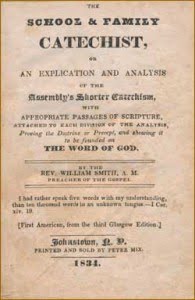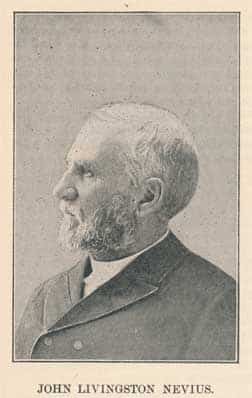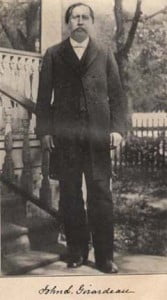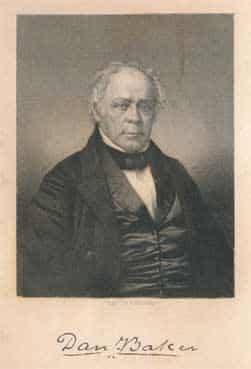 THE SCHOOL & FAMILY CATECHIST
THE SCHOOL & FAMILY CATECHIST
by Rev. William Smith (1834)
The Westminster Shorter Catechism, Questions 53-54.
Q.53. Which is the third commandment?
A. The third commandment is, “Thou shalt not take the name of the Lord thy God in vain, for the Lord will not hold him guiltless that taketh his name in vain,” Exod. xx. 7.
EXPLICATION.
Take the name of God in vain. —To mention the name of God when there is no occasion for doing it ; and to use it without that seriousness and reverence, with which we ought always to speak of God, and to pronounces his name.
Not hold him guiltless. —Not suffer him to go unpunished.
Q.54. What is required in the third commandment?
A. The third commandment requireth the holy and reverent use of God’s names, titles, attributes, ordinances, word, and works.
EXPLICATION.
Reverent use. —Using them with a holy fear an awe of God upon our minds, and at the same time with love to him in our hearts.
God’s names. —Such as Jehovah, Jah, God, Lord, I am, &c.
God’s titles. —Such as the Lord of hosts, the God and Father of the Lord Jesus Christ, the Holy One of Israel, the God of salvation ,the Hearer of prayer, &c.
Attributes of God. —His perfections, such as Infinity, Eternity, Unchangeableness, Power, Wisdom, Truth, Holiness, Goodness, &c.
Ordinances of God. —God’s appointments, such as prayer, preaching, the sacraments, lawful oaths, &c.
God’s Word. —His revealed will, as contained in the Scriptures, which may be divided into the Law and the Gospel.
God’s works. —The works of Creation, Providence, and Redemption.
ANALYSIS.
The duties required in the third commandment are six in number :
- A holy and reverend use of God’s name. —Psalm xcvi. 8. Give unto the Lord the glory due unto his name.
- A holy and reverent use of God’s titles. —Rev. xv. 3, 4. Just and true are thy ways, thou King of saints. Who shall not fear thee, O Lord, and glorify thy name?
- A holy and reverent use of God’s attributes. —Jer. x. 6, 7. O Lord, thou art great, and thy name is great in might. Who would not fear thee, O King of nations?
- A holy and reverent use of God’s ordinances. —Eccles. v. 1. Keep thy foot when thou goest to the houses of God, and be more ready to hear, than to give the sacrifice of fools.
- A holy and reverent use of God’s word. —Psalm cxxxviii. 2. I will worship towards thy holy temple, and praise thy name for thy loving-kindness, and for thy truth; for thou has magnified thy word above all thy name.
- A holy and reverent use of God’s works. —Job xxxv. 24. Remember that thou magnify his work, which men behold.


 “Despite the fanfare and cavalcades for evangelism, this last year saw the lowest increase on professions of faith in five years, the greatest number of losses, and the lowest net gain. These shocking statistics ought to send us to our knees that we may know God’s way with His people today. Perhaps, there is a word for this year in the account of the revival God granted through John L. Girardeau’s ministry in the Anson St. Presbyterian Church of Charleston where nine-tenths of the 500 members were Negroes.
“Despite the fanfare and cavalcades for evangelism, this last year saw the lowest increase on professions of faith in five years, the greatest number of losses, and the lowest net gain. These shocking statistics ought to send us to our knees that we may know God’s way with His people today. Perhaps, there is a word for this year in the account of the revival God granted through John L. Girardeau’s ministry in the Anson St. Presbyterian Church of Charleston where nine-tenths of the 500 members were Negroes.
